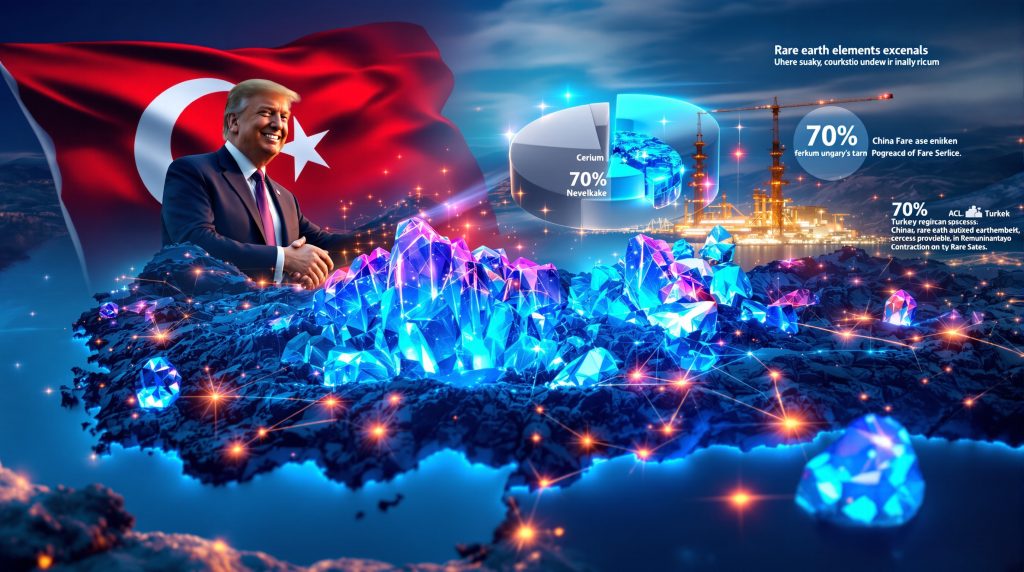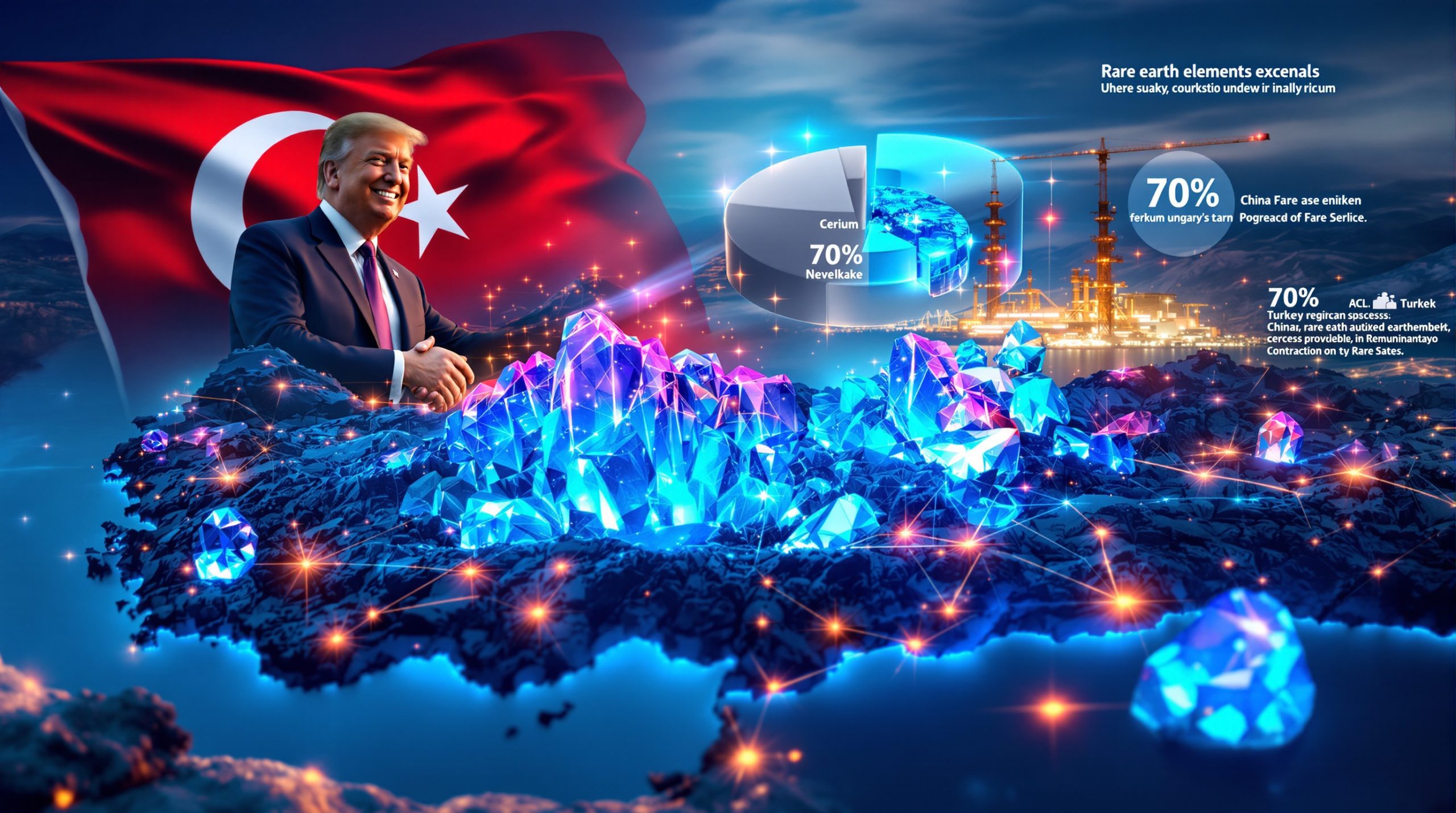Turkey's Strategic Pivot: The US-Turkey Rare Earth Deal's Global Significance
Turkey's recent discovery of rare earth elements in the Beylikova region has positioned the nation at a critical juncture in global mineral politics. As negotiations with China and Russia falter, Turkey is increasingly looking toward the United States for partnership in developing these strategically important resources. This potential alliance could reshape global rare earth markets currently dominated by China and create new geopolitical dynamics within NATO and beyond.
What Are the Key Details of Turkey's Rare Earth Discovery?
The Beylikova Deposit's Significance
The Beylikova rare earth deposit, located near Eskisehir in central Anatolia, represents a significant opportunity for Turkey to become a major player in the critical minerals supply chain. Initial assessments reveal the presence of valuable elements including cerium, praseodymium, and neodymium – essential components for technologies ranging from electric vehicles and wind turbines to advanced defense systems.
According to preliminary testing, the ore contains more than 1% rare earth oxide by weight, sufficient to make commercial extraction economically viable. This concentration level is particularly noteworthy as it meets industry standards for commercial development, potentially making Turkey an important non-Chinese source of these critical minerals energy security.
Geological Context and Reserve Potential
To establish the deposit's global significance, Turkey is pursuing certification under the internationally recognized JORC Code through the Australian Institute of Geoscientists. This rigorous certification process will provide transparent documentation regarding the size and quality of the deposits, making the project more attractive to potential investors and partners.
The certification will help quantify exactly how much Turkey's discovery could impact global supply chains, where China currently controls approximately 70% of global production. Geological experts note that the Anatolian region has long been recognized for its diverse mineral deposit tiers guide, but comprehensive exploration for rare earth elements has been limited until recently.
How Did Turkey's Negotiations with China and Russia Falter?
China's Restrictive Approach
Despite signing a memorandum of understanding with China in October 2024, negotiations stalled when Beijing insisted on terms that would have limited Turkey's ability to develop domestic capabilities. The Chinese negotiating position included several problematic elements:
- Transportation of raw materials to China for processing
- Refusal to transfer critical processing technology
- Limited opportunities for Turkey to develop value-added refining capabilities
- Restrictions that would have prevented Turkey from developing expertise in rare earth processing
These terms reflected China's longstanding strategy of maintaining control over the entire rare earth value chain, from mining to finished products. For Turkey, accepting such terms would have meant surrendering much of the economic and strategic value of its discovery.
Russia's Unsuccessful Engagement
Parallel discussions with Russia similarly produced no concrete agreements. While specific details of these talks remain undisclosed, industry analysts suggest Russia likely faced limitations in offering competitive processing technology compared to Western alternatives. Additionally, geopolitical considerations may have influenced Turkey's decision to pivot toward NATO partners rather than deepening mineral resource ties with Russia.
This pattern of unsuccessful negotiations with non-NATO powers ultimately pushed Turkey to reconsider its strategic partnerships for rare earth development, opening the door for enhanced US-Turkey cooperation.
Why Is Turkey Pivoting to the United States?
Strategic Alignment Following Presidential Meeting
The momentum for US-Turkey cooperation gained significant traction after high-level diplomatic engagement between the two nations. This diplomatic warming signaled an opportunity to expand cooperation beyond traditional defense matters to include strategic resources like rare earths.
The potential partnership reflects broader strategic considerations, including:
- Enhanced bilateral economic relations
- Strengthening of Turkey's position within NATO
- Potential technology transfer agreements
- Joint development of critical mineral supply chains
For Turkey, alignment with the US offers access to advanced processing technology and potential investment that could accelerate development of the Beylikova deposit.
Turkey's Technology Transfer Requirements
Unlike the failed negotiations with China, Turkey's discussions with the US emphasize developing domestic capabilities rather than simply exporting raw materials. Key Turkish requirements include:
- Development of local refining capacity in Beylikova
- Technology transfer agreements for processing know-how
- Training and skills development for Turkish workers
- Creation of a complete value chain from mining to finished products
These requirements align with Turkey's broader industrial development goals of moving up the value chain in strategic sectors rather than remaining merely a supplier of raw materials.
Broader NATO Strategic Considerations
The potential partnership carries significant implications for NATO's collective resource security:
- Reducing alliance-wide dependency on Chinese rare earth supplies
- Creating resilient supply chains for defense technologies
- Strengthening Turkey's strategic value within NATO
- Developing alternatives to Chinese processing dominance
From a security perspective, NATO has increasingly recognized rare earth elements as strategically vital materials whose supply chains represent a potential vulnerability. A Turkey-US partnership could address this vulnerability while reinforcing alliance cohesion.
What Makes This Deal Globally Significant?
Disrupting China's Rare Earth Dominance
The potential US-Turkey partnership represents a direct challenge to China's near-monopoly in the rare earth sector. Currently, China controls:
- Approximately 70% of global rare earth mining
- Nearly 90% of worldwide processing capacity
- Critical supply chains for technologies from smartphones to fighter jets
- Price-setting mechanisms for most rare earth elements
This concentration of control has led to supply vulnerabilities that became apparent during past diplomatic tensions when China restricted rare earth exports. The development of Turkey's deposits under a partnership with the US could significantly reduce this market concentration.
Creating Alternative Supply Chains
This deal would align with broader Western initiatives to develop rare earth sources outside China's sphere of influence:
- Complementing US domestic rare earth revival efforts at mines like Mountain Pass
- Supporting the US-EU critical raw materials facility
- Creating redundancy in global supply chains
- Establishing processing capabilities independent of Chinese technology
Industry experts note that successful diversification requires not just new mining operations but also processing capabilities – precisely what the Turkey-US partnership aims to develop.
Economic Impact on Global Markets
A successful Turkey-US rare earth partnership could create several market-wide benefits:
- More stable global rare earth prices through increased competition
- Reduced market volatility during geopolitical tensions
- More transparent pricing mechanisms
- New industry benchmarks for responsible sourcing and processing
- Decreased vulnerability to supply manipulation
These market impacts would benefit not just the US and Turkey but all nations dependent on rare earth elements for high-tech manufacturing and clean energy development.
How Does Turkey Plan to Develop Its Rare Earth Industry?
Domestic Refining Facility Development
Turkey has clearly stated its intention to build processing infrastructure in Beylikova rather than exporting raw materials. This approach aims to:
- Maximize domestic economic benefits through value-added processing
- Develop high-value technical capabilities within Turkey
- Create skilled employment opportunities
- Establish Turkey as a regional processing hub
The planned refining facility would represent a significant industrial development for Turkey, potentially creating an estimated 1,000+ direct jobs and many more indirect positions through supply chain effects.
Multi-Partner Approach
While focusing on US cooperation, Turkey continues parallel discussions with other potential partners:
- Canadian mining expertise providers with experience in rare earth extraction
- Swiss technical and financial partners for processing technology
- International certification bodies for reserve validation
- Specialized equipment suppliers for separation technology
This multi-partner approach reflects the complex nature of rare earth development, where different aspects of the value chain require specialized expertise from various sources.
Feasibility Studies and Technical Planning
Current development activities focus on creating a solid foundation for the project:
- Comprehensive geological assessments to map the full extent of deposits
- Processing technology evaluations to determine optimal extraction methods
- Environmental impact studies to ensure sustainable development
- Infrastructure requirements mapping for transportation and energy needs
These preliminary steps are critical for attracting investment and establishing realistic timelines for development, with industry standards suggesting a 3-5 year timeline from agreement to production for similar projects.
What Are the Geopolitical Implications of This Partnership?
Shifting Alliances in Critical Minerals
The Turkey-US rare earth negotiations represent a significant realignment in global critical mineral politics:
- Turkey balancing between Western and Eastern partnerships
- US expanding its rare earth strategy beyond domestic sources
- China potentially losing influence in a strategic NATO country
- New patterns of resource cooperation within NATO
This realignment comes as critical minerals increasingly become a focus of geopolitical competition, with nations seeking secure supply chains for technologies ranging from electric vehicles to advanced weapons systems.
Impact on Regional Power Dynamics
A successful partnership could enhance Turkey's regional position in several ways:
- Increasing economic leverage with neighboring countries
- Strengthening Turkey's position in EU negotiations
- Providing greater independence in foreign policy decisions
- Establishing Turkey as a key player in critical mineral markets
Regional experts note that control of rare earth processing would give Turkey significant influence in high-technology manufacturing chains throughout the broader Middle East and Eastern Mediterranean region.
Integration with Broader US Critical Minerals Strategy
This potential deal complements other US initiatives aimed at reducing dependence on Chinese rare earths:
- Investment in domestic rare earth processing
- Strategic partnerships with Australia and Canada
- Development of recycling technologies for rare earth recovery
- Research into alternative materials to reduce rare earth dependence
The Turkey partnership would fit into this multi-faceted approach, creating a network of allied nations with rare earth capabilities rather than relying on a single alternative to Chinese dominance.
What Challenges Could Affect the Turkey-US Rare Earth Deal?
Technical and Financial Hurdles
Developing rare earth processing capabilities presents significant challenges:
- High capital costs for processing facilities, typically ranging from $200-500 million
- Complex extraction and separation technologies requiring specialized expertise
- Environmental management requirements for potentially radioactive byproducts
- Quality control to meet international standards for high-purity materials
The technical complexity of rare earth processing cannot be underestimated – it involves hundreds of separation steps to achieve the purities required for high-tech applications.
Potential Political Complications
The partnership faces several political considerations that could impact implementation:
- Changing priorities with political transitions in either country
- Competing interests from other global powers seeking influence
- Domestic political considerations about resource nationalism
- Regulatory and compliance requirements in both nations
These political factors introduce uncertainty that investors and developers must account for when planning long-term projects.
Market and Economic Factors
Several market variables could impact the partnership's success:
- Fluctuating rare earth prices affecting project economics
- Evolving demand patterns for specific elements
- Competition from other emerging sources in Vietnam, Brazil, and Australia
- Development of alternative technologies that could reduce rare earth demand
Industry analysts note that rare earth markets are notoriously volatile, with price swings of 200-300% not uncommon over relatively short periods, creating challenges for long-term investment planning.
How Could This Partnership Transform the Global Rare Earth Market?
Diversification of Global Supply
A successful Turkey-US partnership would create significant changes in global rare earth supply:
- Establishing a major non-Chinese source for critical rare earths
- Developing new processing capabilities outside Chinese control
- Providing alternative sources for Western manufacturers
- Reducing vulnerability to supply disruptions during geopolitical tensions
This diversification would address a key vulnerability that has concerned defense and technology planners for over a decade.
Setting New Industry Standards
The partnership could establish new benchmarks for the rare earth industry:
- Environmental practices in rare earth processing that minimize pollution
- Worker safety and labor standards exceeding current industry norms
- Transparency in pricing and contracts that could become market standards
- Responsible sourcing certification to address environmental and social concerns
These standards could create market pressure for improvements throughout the industry, including at Chinese operations that have historically faced criticism for environmental practices.
Long-term Market Stabilization
With proper development, the partnership could contribute to a more stable global rare earth market:
- More predictable pricing through increased competition
- Reduced potential for market manipulation by any single producer
- Greater supply chain resilience during regional disruptions
- More balanced global distribution of processing capacity
These market benefits would extend beyond the direct participants to benefit all industries dependent on rare earth elements, from electronics to renewable energy.
What Are the Next Steps for the Turkey-US Rare Earth Partnership?
Formal Agreement Development
The countries are working toward formalizing their cooperation through:
- Defining specific roles and responsibilities for each partner
- Establishing investment parameters and financing mechanisms
- Creating technology transfer protocols that protect intellectual property
- Setting development timelines and performance benchmarks
These formal structures will be essential for moving from exploratory discussions to implementation.
Technical Assessment Completion
Critical next phases include finalizing the technical groundwork:
- Completing comprehensive resource assessments to quantify reserves
- Determining optimal extraction and processing methods
- Designing processing facilities with appropriate environmental safeguards
- Planning infrastructure development for power, water, and transportation
These technical foundations will determine the economic viability and environmental sustainability of the project.
Regulatory and Compliance Framework
Both countries must address regulatory considerations:
- Environmental permitting requirements for mining and processing
- Export control considerations for sensitive technologies
- Technology transfer regulations that comply with national security requirements
- Investment protection mechanisms to safeguard participating companies
These regulatory frameworks will need to balance security concerns with the need for efficient development of the resources.
Understanding the Global Implications of the Turkey-US Rare Earth Partnership
The potential Turkey-US rare earth partnership represents more than just a bilateral resource development project – it signals a significant shift in global critical mineral politics with implications for technology supply chains, defense capabilities, and geopolitical alignments.
For Turkey, successful development of the Beylikova deposit would transform the country from a mineral resource importer to a significant producer of strategic materials. For the US, the partnership represents an important step in reducing Chinese dominance of critical minerals essential for both civilian and defense technologies.
The coming years will reveal whether this partnership can overcome the technical, financial, and political challenges inherent in developing new rare earth processing capabilities. If successful, it could serve as a model for other resource partnerships that balance national interests with the need for diversified global supply chains in critical minerals executive order.
As global demand for rare earth elements continues to grow with the expansion of clean energy, electric vehicles, and advanced electronics, the strategic importance of these resources will only increase. The Turkey-US partnership may prove to be a pivotal development in ensuring stable, diversified supply chains for these critical materials.
Considering Investing in Critical Minerals and Rare Earth Stocks?
For real-time alerts on significant mineral discoveries like Turkey's Beylikova rare earth deposit, visit Discovery Alert's dedicated discoveries page to see how major mineral finds can generate substantial returns. Discovery Alert's proprietary Discovery IQ model transforms complex ASX announcements into actionable investment insights, giving you the market-leading advantage needed in today's competitive critical minerals landscape.




